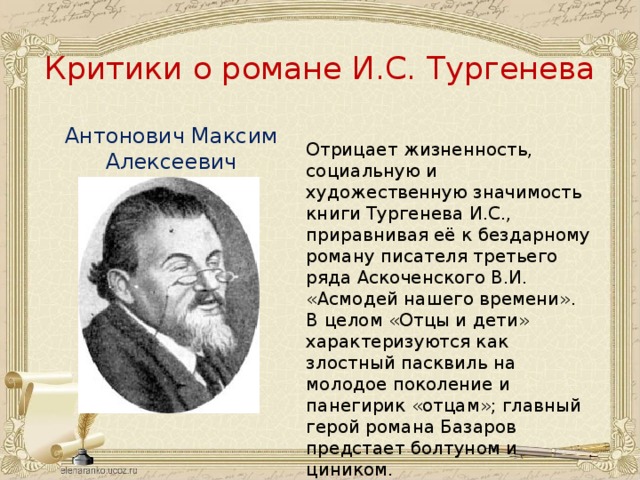The philosopher who popularized materialism in Russia: Who is Maxim Alexievich Antonovich?
In fact, he studied religion. But he believed that matter was the only truth and defended materialist morality.

(1835-1918) Russian philosopher. He pioneered the recognition and spread of the materialist philosophy in Russia. He was born in the city of Belopolye in the Kharkiv region. He studied religion at the request of his family, who were very attached to his beliefs and traditions. He graduated from the St Petersburg Theological Academy. He left the church circle under the influence of the materialist philosophy that developed rapidly in Germany and France. He worked as a journalist and magazine writer for a while. He published articles on philosophy in the journal Sovremennik. He published his work as a book on the closure of the journal.
Maxim Alexeyevich Antonovich (9 May 1835, – 14 November 1918) was a Russian literary critic, essayist, memoirist, translator and philosopher. Maxim Antonovich was born in Belopolye, Sumskoy Uyezd, Kharkiv Governorate, to the family of a clergyman. After studying at the Kharkiv seminary he enrolled in the Saint Petersburg Theological Academy which he graduated in 1859.
In addition to his philosophical and scientific studies, he took initiatives for the education and literacy of the villagers, who constitute the productive part of the society; he criticized the administration. He advocated the view of establishing a fundamental link between philosophy and social activism.
Antonovic began his philosophical studies by criticizing theorists such as Hegel-Kant. His views on materialist philosophy stem from his contemporary Chernyshevsky and Feuerbach.
According to Antonovich, the only reality is matter. To think of something that can be called "being" outside of matter is to remain under the influence of the old speculative philosophy. Labor is the main productive factor. For this reason, the social order and state administration should focus on the working people community. The development and enlightenment of the Russian nation depend on the reorganization of social institutions according to the understanding of contemporary civilization and the philosophy of life that finds its source in labor.
The basis of education should be a materialist view of life-based on experimental sciences.
Antonovic opposed the traditionalist, theorist view on aesthetic issues based on the materialist understanding. In particular, he defended the idea that "art is for the working society" instead of "art is for art".
After his death, Antonovich's ideas were expanded and developed. It has also been suggested that his materialism has a theoretical side.
